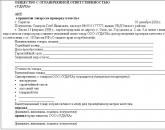The procedure for applying and issuing a disciplinary sanction
The term "disciplinary sanction" refers to a certain type of punishment that is applied to an employee who improperly performs the labor duties prescribed in the contract. All types of punishments are reflected in Chapter 30 of the Labor Code of the Russian Federation. Penalties may also be applied as disciplinary sanctions if such are provided for by the company's charter, federal laws or internal regulations.
It is worth noting that the punishment should correspond to the severity of the misconduct (Article 192 of the Labor Code), but, alas, as practice shows, most often a disciplinary sanction is exclusively subjective. In what case is the manager right, and is it possible to appeal against an illegal decision?
The main types of disciplinary sanctions
According to the Labor Code of the Russian Federation, a penalty can be applied against an employee of the company (note - Art. 192) with one of the degrees of severity of consequences for the violator. In this case, the punishment directly depends on the violation.
So, according to the law, management has the right to ...
- Issuance of a formal comment.
- To issue a reprimand or a severe reprimand.
- To terminate the employment contract (dismissal).
And also on… 
- Release from a job.
- Warning about the fact of inconsistency (incomplete compliance) of the position.
Other types of punishments (in particular, deprecation or reduction of wages) are unlawful. An exception is if they are spelled out in the charter or regulatory documents of the organization.
When is disciplinary action applied?
As we found out, the main provisions on the procedure and types of disciplinary sanctions are clearly spelled out in the Labor Code. But, unfortunately, cases of both dishonest performance of duties by employees and unreasonable punishments for innocent employees are not uncommon.
In what cases is a disciplinary sanction justified and legal?
Cases will be legal (they are defined by Article 192 of the Labor Code) if the violated duties were spelled out in the employment contract under the signature of the employee himself.
So, the recovery is legal if the employee ...
- Carried out an action that was not permitted by documented procedures or work instructions.
- Violated job descriptions or other company norms (direct duties, order of the head, etc.).
- Violated labor discipline (unreasonable absence from work, being late, etc.).
The following penalties are illegal:
- Indistinct fines, not fixed in company documents.
- Salary cuts.
- Arbitrary punishments that are not accompanied by their appropriate design - punishment "in words".
- Abuse of penalties to manipulate employees.
- Any punishments that do not comply with the employment contract or the Labor Code of the Russian Federation.
Registration procedure
Any disciplinary punishment requires appropriate registration and its order.
Documentary fixation of the fact of violation
That is, drawing up an act (note - in case of an unreasonable absence of an employee), a memorandum (note - in case of violation of the deadlines for the delivery of work) or a decision of the commission (note - conclusion on withholding the amount of the shortage).
Obtaining an explanation from the employee (its failure to provide it within 2 days must be recorded in a certain relevant act)
The requirement for an explanatory note is made in writing and is transferred against the signature of the violator. If the employee refuses to sign, an appropriate act is drawn up, which, together with a written request, will be considered sufficient grounds for recovery.
If an explanatory note is provided in a timely manner, the manager considers it and makes a decision
For good reasons, the imposition of a penalty can be canceled, otherwise it can be applied.
Creation of an order and decision on the type of punishment applied.
Such a decision  the head accepts personally, based on the misconduct itself, its circumstances, the certain severity of the consequences, etc. After preparing the order, it is presented to the employee against signature within 3 days.
the head accepts personally, based on the misconduct itself, its circumstances, the certain severity of the consequences, etc. After preparing the order, it is presented to the employee against signature within 3 days.
- Name, position, place of work of the employee.
- The essence of the violation + an indication of the violated points.
- Description of the violation itself + conclusion about the severity of the violation and the fault of the employee directly.
- Collection type.
- Grounds for collection (all acts, explanations, details of documents).
On a note: A completed order that is not in the form may be a reason for appealing it. The refusal of the violator to familiarize himself with the order and to confirm this fact with his signature is recorded by drawing up an act.
Information about punishment the head can enter in a personal card (this is optional). Such information is not included in the work book.
Terms of application
It is worth remembering that the terms of prosecution are clearly spelled out in the law.
- The penalty is applied within 1 month (and no later!) from the moment of misconduct (not counting vacation, illness of the employee).
- Penalty shall not be applied later than six months from the moment of misconduct.
- Also, the penalty is not applied later than 2 years after the commission of the misconduct based on the results of an audit, as well as an audit of financial and economic activities, or based on the results of an audit.
If the manager fails to comply with the deadlines (and other violations in the execution of documents) established by law, and the labor inspector discovers this fact, the order is considered a violation of the employee's rights and can be appealed in court.
The procedure for appealing and lifting a disciplinary sanction
In the case when the employee has not committed any new violations within 1 year from the moment the penalty was applied, the “punishment status” is canceled (terminates) and, according to Article 194 part 1 of the Labor Code, the violator begins to be considered an employee who does not have penalties.
It is also worth mentioning that during this year the direct employer can remove the penalty from his employee on the initiative coming from the trade union committee, at the request of the violator (Article 194, part 2 of the Labor Code) or at the request of the head.
Can I appeal the charge?
Can. There is also an appeal procedure for this. In case when  the employee does not consider the punishment legal and fair, he must draw up an appropriate statement and send him…
the employee does not consider the punishment legal and fair, he must draw up an appropriate statement and send him…
- to the labor inspectorate.
- to the Dispute Resolution Committee.
- Or to court.
The appeal period is 3 months from the moment the employee received the notice of recovery. Or 30 days, if this penalty involves the dismissal of an employee.
Consequences for the worker
If a penalty is imposed on an employee, the employer can ...
- Depremium (fully/partially).
- Withdraw other payments.
True, only on condition that such a provision exists in the company's documents. With regard to dismissal, such punishment usually follows only especially serious violations. For example, if the company suffered losses as a result of the offender's misconduct, the employee was seen at the workplace in a state of intoxication, or the employee, after being punished for 1 year, was repeatedly noticed in violation of his duties.
Organization Responsibility
If the punishment was unlawful, then the employee has every right to complain to certain authorities, as a result of which the labor inspector usually checks the situation for the legality of the penalty and the literacy of its execution.
Identified violations are a reason to bring the company to administrative responsibility and recognize the imposed penalty as illegal (that is, to cancel it). In such a situation, the employee can count on the restoration of his rights, as well as compensation for non-pecuniary damage from the employer (and for missed working hours, if he was fired).
Also, the employer will bear legal costs, inspections by prosecutors and inspectors, lawyers' expenses and, most likely, a fine.
Not to mention the loss of credibility in front of their employees and the damage to business reputation.
Distribution of places in kindergarten in 2017 - what to do and where to go if the child is not given a place in kindergarten?
Russians with minor children can count on a place in a children's institution. This right to free education for every child is enshrined in the Constitution of the Russian Federation. We will tell you who can get a place, where to stand in line and what to do in case of refusal.
Popular
- How to get a TIN: possible ways
- What kind of business can you do?
- Written notice of termination of the lease
- Business from scratch. Things to do?
- Cost of goods sold: formula, methodology and calculation example
- How to write a vacation application - examples
- What kind of business can be opened in a small town or village?
- The formula for calculating the cost of services, products sold and total cost
- Sample memorandum: I bring to your attention
- Example of an explanatory note for being late for work




